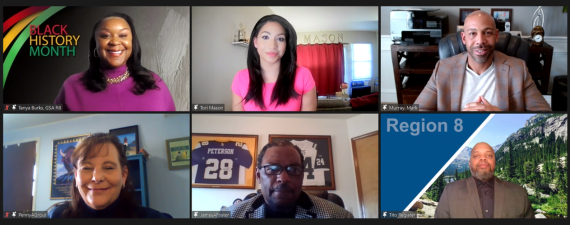Region 8 Diversity Program Spotlights Black Health and Wellness

The advancement of Diversity, Equity, Inclusion and Accessibility (DEIA) has been a focus for GSA under the Biden Administration to promote opportunity in our workplace and encourage black-owned businesses to work with us.
The emphasis on DEIA has a long history within Region 8, which held its 21st annual Diversity Program supporting this year’s theme “Black Health and Wellness” on February 17.
The guest speaker for the event was Dr. Mark Murray, the Executive Medical Director for Neuroscience and Interventional and Vascular Neurologist at Centura Health in Denver, Colorado.
Black health and wellness encompasses many things including fitness, nutrition and access to proper medical care.
The focus for Murray’s presentation centered on health care disparities, specifically around access to health care professionals, but also mentioned diet and lack of availability to nutritional foods that are a contributing factor in many diseases once thought to be genetic.
“I always wanted to know about these healthcare disparities, I always thought they were genetic,” said Murray. “Genetics actually play a small role in diseases such as high blood pressure, diabetes, high cholesterol, strokes, and cardiovascular disease.”
Murray added that the major role in the cause of these diseases is access to good quality food.
In Black neighborhoods with no grocery stores, the only options are fast food or shopping for canned fruit and vegetables at a convenience store. These types of foods are loaded with sodium and sugars. These affordable foods do not have the proper nutritional value and contribute significantly to chronic illnesses in black communities.
Nutrition is one of the healthcare disparities, the other is access. Healthcare offices are not located near black communities so going to the doctor means having to take a day off from work, not just a couple of hours. Missing a day of work impacts those that are living paycheck to paycheck. The choice becomes having to feed the family or pay bills vice keeping an appointment with the doctor.
But when they do go to the doctor, especially if it is for something severe, many Black family members don’t get the care they deserve.
“We were talked down to and looked at differently,” said Murray, relating a personal experience. “My grandfather was asked how many drugs he did. He didn’t do any drugs, but he was made to feel as if he made these things happen to him.”
Many black families have experienced this very thing and are sometimes stereotyped by negative behaviors instead of being treated for the illnesses they came in to get looked at in the first place.
The Centers for Disease Control and Prevention statistics show that Black people are at a higher risk for high blood pressure, diabetes and strokes. New studies show that COVID-19 affects the Black population more due to chronic diseases but also because of decades of distrust about medical care and they don’t get vaccinated at a higher rate.
The reason: “It is access,” said Murray. “If I can’t go to the doctor, if I think that when I go to the doctor they will treat me as less than human or they are not going to treat me as someone who deserves care. If I can’t get access to quality food or get access to medicine because of the cost. Those are the choices the Black community faces today.
Murray left the audience with a final message, “If we can open up the access, we can get quality food and quality medicines to those populations, think of what we can do.”
The event was put on by the Region 8 Black Employee Program. Special thanks go to Tanya Burks, James Foster, Tito Register, Elatha Green, Demetrious Nichols, Danielle Bradley, Robert Smith, Antoinette Jones, Ajani Wihelm, and Greg Williams for all their work and effort to make this program impactful and a proud element to the culture of Region 8.

 U.S. General Services Administration
U.S. General Services Administration